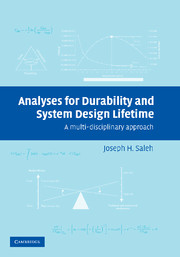Book contents
- Frontmatter
- Contents
- Preface
- 1 Introduction: On Time
- 2 To Reduce or to Extend Durability? A Qualitative Discussion of Issues at Stake
- 3 A Brief History of Economic Thought on Durability
- 4 Analysis of Marginal Cost of Durability and System Cost per Day
- 5 Flawed Metrics: System Cost per Day and Cost per Payload
- 6 Durability Choice and Optimal Design Lifetime for Complex Engineering Systems
- EPILOGUE: Perspectives in Design: The Deacon's Masterpiece and Hundred-Year Aircraft, Spacecraft, and Other Complex Engineering Systems
- APPENDIX A Beyond Cost Models, System Utility or Revenue Models: Example of a Communications Satellite
- APPENDIX B On Durability and Economic Depreciation
- Index
- References
5 - Flawed Metrics: System Cost per Day and Cost per Payload
Published online by Cambridge University Press: 25 October 2009
- Frontmatter
- Contents
- Preface
- 1 Introduction: On Time
- 2 To Reduce or to Extend Durability? A Qualitative Discussion of Issues at Stake
- 3 A Brief History of Economic Thought on Durability
- 4 Analysis of Marginal Cost of Durability and System Cost per Day
- 5 Flawed Metrics: System Cost per Day and Cost per Payload
- 6 Durability Choice and Optimal Design Lifetime for Complex Engineering Systems
- EPILOGUE: Perspectives in Design: The Deacon's Masterpiece and Hundred-Year Aircraft, Spacecraft, and Other Complex Engineering Systems
- APPENDIX A Beyond Cost Models, System Utility or Revenue Models: Example of a Communications Satellite
- APPENDIX B On Durability and Economic Depreciation
- Index
- References
Summary
PREVIEW AND GUIDE TO THE CHAPTER
In engineering design, metrics play a critical role in guiding design choices. It is therefore of prime importance that the metrics used in the decision-making process be the “right” metrics. Systems engineers and program managers often invoke the traditional “economies of scale” argument, and the associated metrics, to justify the design of larger, more capable, and longer-lived systems. This chapter challenges the traditional economies of scale argument in system design and makes the case that two metrics used to guide design choices, the cost per day and cost per payload (or capability), are flawed under certain environmental conditions and result in design choices – increasingly longer-lived systems and larger payloads – that do not necessarily maximize the system's value.
First, this chapter advocates a value-centric mindset in system design and proposes shifting the emphasis from cost to value analyses to guide design choices that maximize a system's value. The case is made that dynamic environmental conditions or competitive markets require a value-centric mindset that views an engineering system as a value-delivery artifact and integrates considerations about the system's cost, its technical environment, and the environment it is serving in order to make appropriate system design choices.
Second, this chapter shows that, although the cost-per-day and cost per payload metrics are useful guides for design choices in a supply-constrained market (in which a cost-centric mindset can prevail), they are flawed metrics on which to base design choices if the system's environment is uncertain or dynamic or the market is competitive.
- Type
- Chapter
- Information
- Analyses for Durability and System Design LifetimeA Multidisciplinary Approach, pp. 81 - 100Publisher: Cambridge University PressPrint publication year: 2007



